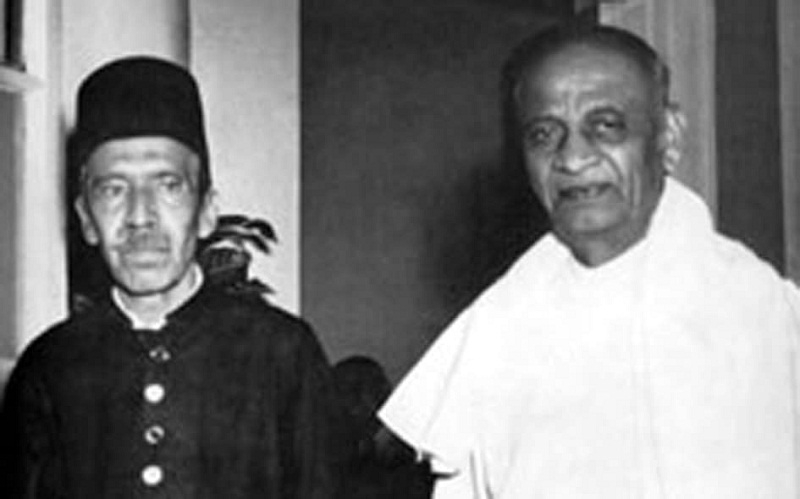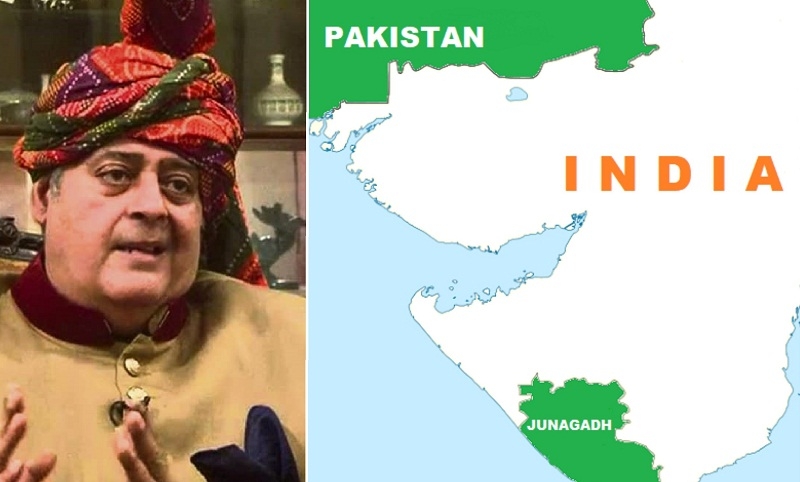The Other Two Cases: Hyderabad and Junagarh - Part VI

Hyderabad Princely State: The forebears of the Asaf Jahi Dynasty came to India from Samarkand, in Central Asia, but the family actually originated from Baghdad. In 1724, the Mughal Governor of the Deccan, Asaf Jah, Nizam ul-Mulk, Qamar ud-din Khan, established himself as an independent ruler of Deccan. Aurangabad was its first capital city; later Hyderabad became the capital and later lent its name to the state he had created.
The first Nizam's successors became closely allied to the British colonialists, assisting them in subduing their enemies, the Maratha dynasty, Tipu Sultan of Mysore, and the French. In later years, the Nizam's troops invariably took part in all the main campaigns of the British Indian Army. Large numbers of his troops took part in the First and Second World Wars. These contributions earned for the Nizam unequalled titles and honors from a grateful Emperor.
The state was the largest and premier of all princely states within the British Indian Empire. After the Pakistani and Indian Independences, the 7th Nizam of Hyderabad, Osman Ali Khan, Asaf Jah VII decided that the Princely state of Hyderabad will not join the New Dominion of India or Pakistan. His decision found favor with Pakistan but not with India. The Nizam’s state was a prosperous one and had its own army, railway and airline network, postal system and radio network. On 15th August, 1947, India declared itself an independent nation. And so did Hyderabad.
At the time of the Independence movement of India, the State of Hyderabad was the largest of the princely states in India. The Nizams of Hyderabad ruled over lands extending to cover 82,698 mi² (214,190 km²) of fairly homogenous territory, bigger than Belarus but smaller than Guyana. The Nizam ruled over a cosmopolitan population of roughly 16.34 million people (as per the 1941 census). These advantages persuaded the Nizam to attempt an Independent existence when the British withdrew from the sub-continent in 1947. He refused to join either a Hindu India or a Muslim Pakistan, preferring to form a separate Kingdom within the British Commonwealth of Nations. Hyderabad State had its own Army, Airline, Telecommunication system, railway network, postal system, currency and Radio broadcasting service.
In Hyderabad, where no official Referendum was held and where the ruler did not accede, the forced accession to India brought about by Military action, was presumed to have the tacit approval of the predominantly Hindu population. It was one of several annexations by India, with various rats.
Junagadh was a princely state of the British Raj, located in what is now Gujarat, outside but under the suzerainty of British India.
In the independence and partition of British India of 1947, the 565 princely states were given a choice to either join the new Dominion of India or the newly formed state of Pakistan.
Junagadh Princely State: The Nawab of Junagadh, Muhammad Mahabat Khanji III, whose ancestors had ruled Junagadh and small principalities for some two hundred years, decided that Junagadh should become part of Pakistan, much to the displeasure of many of the people of the state, an overwhelming majority of who were Hindus, about 80%. The Nawab acceded to the Dominion of Pakistan on 15 August 1947, against the advice of Lord Mountbatten, arguing that Junagadh joined Pakistan by sea.
The principality of Babariawad and Sheikh of Mangrol reacted by claiming independence from Junagadh and accession to India, although the Sheikh of Mangrol withdrew his accession to India the very next day. Muhammad Ali Jinnah waited for a month to accept the Instrument of Accession, to see if Nehru would make the argument that a Hindu majority under a Muslim ruler, than he would respond with Kashmir's case being the same. When Pakistan accepted the Nawab's Instrument of Accession on 16th September, the Government of India was outraged that Muhammad Ali Jinnah could accept the accession of Junagadh despite his argument that Hindus and Muslims could not live as one nation. Sardar Vallabhbhai Patel believed that if Junagadh was permitted to go to Pakistan, it would exacerbate the communal tension already simmering in Gujarat.

Vallabhbhai Patel offered Pakistan time to reverse its acceptance of the accession and to hold a plebiscite in Junagadh. Meanwhile, tensions were simmering in the regional areas and in major cities such as Bombay against Nawab's decision. 25,000 - 30,000 people belonging to Saurashtra and Junagadh gathered in Bombay, proclaiming to “liberate” Junagadh from the Nawab's regime. Samaldas Gandhi formed a government-in-exile, the Aarzi Hukumat (in Urdu: Aarzi: Temporary, Hukumat: Government) of the people of Junagadh. Eventually, Patel ordered the forcible annexation of Junagadh's three principalities. Junagadh's state government, facing financial collapse and lacking forces with which to resist Indian force, invited the Government of India to take control. A plebiscite was conducted in December, in which approximately 99.95% of the people chose India over Pakistan.
After the announcement by the last Viceroy of India, Lord Mountbatten, on 3rd June 1947, of the intention to partition British India, the British parliament passed the India Independence Act 1947 on 18 July 1947. As a result, the native states were left with these choices: to accede to either of the two new dominions, India or Pakistan or to remain an independent state.
The constitutional adviser to the Nawab of Junagadh, Nabi Baksh, and Junagadh's ministers gave the impression to Mountbatten that Junagadh intended to accede to India. However, Muslim League politicians from Sindh soon joined Junagadh's executive council and under the influence of the Muslim League the Nawab decided to accede his state to Pakistan, in disregard of Mountbatten's contiguity principle. In theory this was permissible for Junagadh. Mountbatten's contention was that only states bordering Pakistan should accede with it.[15]
The Indian Government made efforts to persuade Nawab of Junagadh to accede to India, but he remained firm. The Indian Minister V. P. Menon came to request an accession to India, threatening consequences in case of denial. Junagadh, under the amendments done to the Government of India Act 1935, had political bands with the neighboring states of Mangrol and Babariawad. In 1943, the latter states were tied to Junagadh through an attachment scheme, but when the act was adopted in 1947, the amendments were not carried over, and this lapse was the base on which VP Menon argued that Junagadh did not have a say in the affairs of Mangrol and Babariawad states.
Nehru strategized that if Junagadh didn't recognize the accession of Mangrol and Babariawad and withdraw its forces from the latter, then he would send in forces, information of which he sent to Pakistan and Britain. Meanwhile, a study case of India regarding Junagadh was made in the international opinion through press communiqués that provided information on Junagadh's geographical contiguity to Indian landscape and its demographics.
Mountbatten and Ayyangar both agreed that the issue of geographical contiguity had no legal standing and that Junagadh's accession to Pakistan was strictly and legally correct. But Sardar Patel demanded that the matter of the state's accession should be decided by its people instead of the ruler. Nehru laid out India's position which was that India did not accept Junagadh's accession to Pakistan. Later at the United Nations Security Council, India's argument revolved around the wishes of the people which it accused the Nawab of ignoring them. India's representative at the UNSC was also advised to avoid legalistic arguments about the Instrument of Accession because of the effect it could have on Kashmir. ]
Upon Menon's advice Mahatma Gandhi's nephew, Samaldas Gandhi, set up a provisional government in Bombay with the Indian government's backing. This government received support from the 'Gujarat States Organization' and also received sponsorship from the Kathiawar Political Conference's Praja Mandal movement.
India allowed the provisional government to take control over outlying areas of Junagadh. However, India later at the UNSC denied ever having supported the provisional government. Pakistan objected to India's indifference to the actions of Junagadh's provisional government. Nehru wrote to Pakistan that the provisional government was "a spontaneous expression of popular resentment" to the state's accession to Pakistan by Junagadh's local population.
Nehru’s telegram to Liaquat Ali Khan: In view of special circumstances pointed out by Junagadh Dewan that is the Prime Minister of Junagadh – our Regional Commissioner at Rajkot has taken temporary charge of Junagadh administration. This has been done to avoid disorder and resulting chaos. We have, however, no desire to continue this arrangement and wish to find a speedy solution in accordance with the wishes of the people of Junagadh. We have pointed out to you previously that final decision should be made by means of referendum or plebiscite. We would be glad to discuss this question and allied matters affecting Junagadh with representatives of your Government at the earliest possible moment convenient to you. We propose to invite Nawab of Junagadh to send his representatives to this conference.
Liaquat Ali Khan replied: Your telegram informing that your Government had taken charge of Junagadh was received by me on November 10, 1947. Your action in taking over State Administration and sending Indian troops to state without any authority from Pakistan Government and indeed without our knowledge is a clear violation of Pakistan territory and breach of International law.
Reports arrived of widespread murder, rape and looting of Muslims in Junagarh following the arrival of Indian troops. Many Muslims from Junagarh began migrating to Pakistan.
After India assumed administration in Junagadh, India's Ministry of Law stated that the accession of Junagadh to Pakistan had not been invalidated by plebiscite and that Junagadh had not yet acceded to India. But India went ahead with the referendum because it believed the result would be in its favor.
On 24 September, legal adviser Monckton told Mountbatten that Pakistan's consent would be needed for any plebiscite India wished to conduct in Junagadh because of the Nawab's accession to Pakistan.
Nehru had shifted from his earlier position of allowing a plebiscite under the UN and now said that it was unnecessary for a plebiscite to be held under the UN though it could send one or two observers if it wished to do so. However, India also made it clear that it would not under any circumstances postpone the plebiscite so as to allow the UN or Pakistan to send observers A plebiscite was held on 20 February 1948, in which all but 91 out of 190,870 who voted (from an electorate of 201,457) voted to join India, i.e. 99.95% of the population voted to join India.
Pakistan brought the case of Junagadh to the United Nations in January 1948. The UN Security Council commanded its commission on Kashmir to examine the conflict over Junagadh. The Kashmir conflict eclipsed the matter of Junagadh at the United Nations Security Council, where Junagadh's case is still unresolved.
In 2020, Pakistan released a new political map that claimed Junagadh, Manavadar and Sir Creek as Pakistani territory. Later the Second Treaty of Amritsar was signed between the British East India Company and Raja Gulab Singh of Jammu. It was an addendum to the Treaty of Lahore, signed one week earlier, which gave the terms of surrender of the Sikh Darbar at Lahore to the British. The Sikhs could not pay part of the demand made by the British; Gulab Singh paid Rs 7,500,000 on their behalf, and in return received Kashmir Valley, part of the Sikh territories, to add to Jammu and Ladakh already under his rule. Gulab Singh accepted overall British sovereignty. Kashmir Valley was a Muslim-majority region speaking the Kashmiri language and had a distinct culture called Kashmiriyat.






